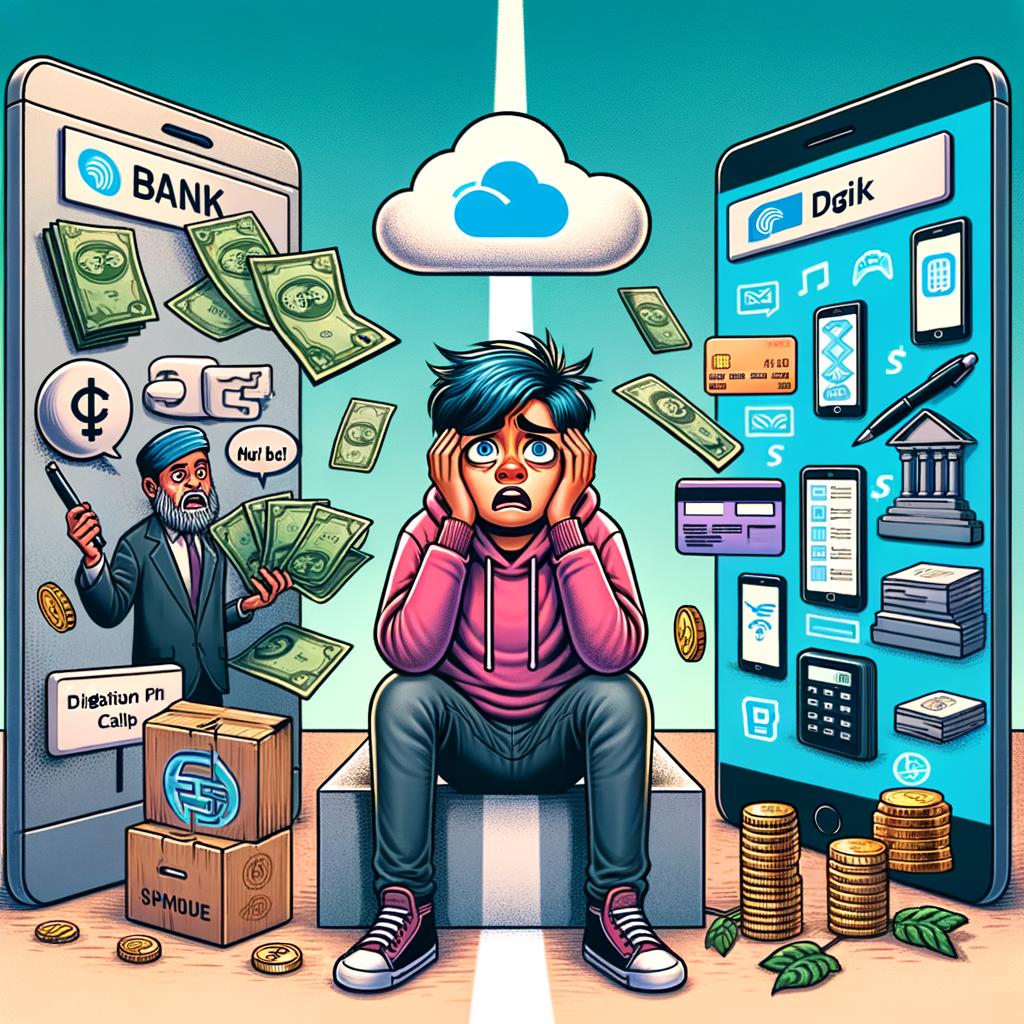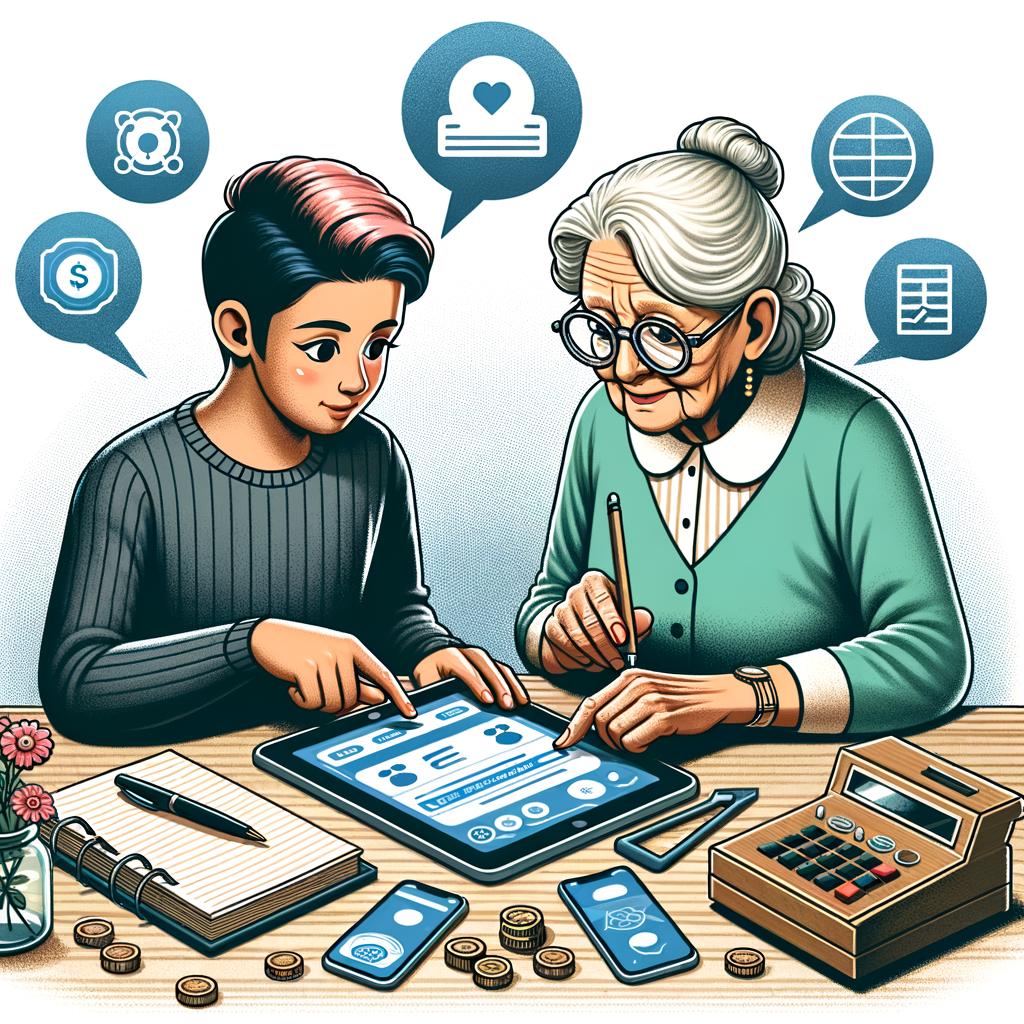In an era where financial transactions can be completed with a few taps on a smartphone, one might assume that the digitally-native Generation Z would possess encyclopedic knowledge about managing money online. However, beneath the façade of tech-savviness lies a surprising paradox: many young people today are navigating the vast ocean of digital finance with little more than a leaky raft. Enter the seemingly unlikely hero—Grandma. Armed with decades of financial wisdom and a knack for prudence, the older generation may hold the very keys to unlocking true digital financial literacy for their tech-savvy grandchildren. This interplay between old-school wisdom and new-age technology forms the crux of our exploration, as we delve into why Gen Z needs a bit of Grandma’s help to truly thrive in the digital financial landscape.
Table of Contents
- Understanding the Generation Gap: Why Gen Z Struggles with Digital Finance
- Grandma’s Secret Sauce: Tried-and-True Financial Wisdom for Modern Times
- Blending Traditional Wisdom with Digital Savvy: Strategies for Better Financial Health
- Actionable Steps: How Gen Z Can Learn from Grandma to Master Digital Finance
- Q&A
- Closing Remarks

Understanding the Generation Gap: Why Gen Z Struggles with Digital Finance
It’s a common misconception that today’s younger generations, particularly Gen Z, have a natural affinity for all things digital. While it’s true that they can navigate social media platforms with their eyes closed, when it comes to digital finance, they might actually need some guidance from their tech-savvy elders. This contradiction stems from complex factors that underscore the generation gap in financial literacy.
Digital finance is not just about knowing how to use mobile banking apps or making purchases online. It encompasses a deeper understanding of cybersecurity, budget management, investment strategies, and a plethora of financial products that can be confusing even to seasoned adults. Gen Z, despite their digital prowess, often finds the financial landscape daunting due to its complexity and the possible risks involved.
Consider the significant influence of instant gratification in the Gen Z mentality. Raised in an era where information and services are available at the tap of a screen, the concept of long-term investments and delayed financial rewards can feel alien. Traditional financial wisdom advocates patience and a slow buildup of wealth, whereas Gen Z might prioritize experiences here and now, often at the expense of savings.
Below is a simple comparison highlighting where the gaps lie in financial literacy between generations:
<table class="wp-block-table alignwide">
<thead>
<tr>
<th>Aspect</th>
<th>Grandma's Generation</th>
<th>Gen Z</th>
</tr>
</thead>
<tbody>
<tr>
<td>Savings & Investments</td>
<td>Deep understanding of bonds, stocks, saving schemes</td>
<td>Familiar but usually prefer quick returns and trends</td>
</tr>
<tr>
<td>Budgeting</td>
<td>Meticulous, usually kept logs and followed budgets strictly</td>
<td>Often relies on budgeting apps but might overspend based on lifestyle</td>
</tr>
<tr>
<td>Cybersecurity</td>
<td>Aware of traditional scams, less on digital fraud</td>
<td>Understands social media privacy, less on digital financial security</td>
</tr>
</tbody>
</table>
The landscape of financial advice has shifted from face-to-face advisor interactions to algorithm-based robo-advisors that provide personalized financial recommendations. While older generations might have struggled to adopt such technology, they possess a strong foundational understanding of financial principles. Gen Z, by contrast, might easily use these digital tools without fully grasping their underlying principles or risks.
Additionally, the plethora of financial content available online, ranging from YouTube tutorials to TikTok influencers, can be both a blessing and a curse. Information overload and varying degrees of credibility can further confuse Gen Z. They may end up following misguided advice because it is succinctly packaged in an appealing format.
It's also worth addressing financial responsibility and the value placed on money itself. War-time and post-war generations grew up with scarcity in mind, which forged a mindset of frugality and savings. Gen Z, growing up in relatively more prosperous times and with easy access to credit, might not have the same innate appreciation for the value of conserving finances.
Intergenerational learning, therefore, presents a viable solution. Grandparents can impart wisdom rooted in experience, covering aspects such as disciplined savings, understanding investments, and the importance of financial planning. In contrast, Gen Z can offer insights into navigating new digital tools, ensuring quick access to financial services, and leveraging technology for financial gains.
By blending the tried-and-true financial wisdom of older generations with the digital finesse of Gen Z, we can create a more holistic approach to financial literacy. This collaborative effort can help young people not only survive in the modern financial world but thrive, achieving financial security and success.

Grandma’s Secret Sauce: Tried-and-True Financial Wisdom for Modern Times
In a world dominated by digital transactions, budget management apps, and cryptocurrency investments, one might wonder if something as old-fashioned as Grandma’s financial wisdom holds any value. But just as her secret sauce has been a hit at every family gathering, her financial advice could be the key to navigating today’s complex digital landscape.
Avoid Unnecessary Debt: Grandma always said, “If you can’t afford it, don’t buy it.” It’s timeless advice. While credit cards and buy-now-pay-later schemes are tempting, they can quickly lead to mounting debt. Gen Z should consider using digital tools to monitor spending but stick to this age-old principle to avoid financial pitfalls. Keeping track of all expenses in a budgeting app helps, but only if you’re honest about your spending habits.
- Utilize budget tracking apps like Mint or YNAB.
- Set up alerts for when you’re about to exceed your budget in any category.
Integrate Tech with Traditional Savings Wisdom: Setting aside a percentage of your income for savings before anything else is a smart move. Grandma probably used a cookie jar, but today you can automate transfers to your savings account. This way, you ensure that a portion of your earnings is saved without even thinking about it.
| Old Wisdom | Modern Tech |
|---|---|
| Save 10% of your income | Automate transfers using your banking app |
| Track expenses in a ledger | Use apps like Expensify |
Emergency Funds are Non-Negotiable: The unpredictability of life hasn’t changed just because we now live in a digital age. Grandma always had a stash for “rainy days.” Gen Z can easily set up an emergency fund account and designate a certain amount to be transferred there automatically each month. Online banks often offer higher interest rates for these types of accounts, making it even more beneficial.
Investment Strategies: While the stock market can seem intimidating, and cryptocurrency even more so, sticking to some of Grandma’s advice can make a big difference. Diversify your investments. Don’t put all your eggs in one basket, whether that’s stocks, bonds, or digital assets. Use platforms like Robinhood or E*TRADE to start small and build a diversified portfolio over time.
- Market fluctuations are normal; don’t panic sell.
- Re-invest dividends to take advantage of compound interest.
The Importance of a Solid Credit Score: Building a good credit score is fundamental. This can be tough if you’re new to credit. However, many apps that help you monitor and improve your credit score, such as Credit Karma and Experian, can make the process less daunting. Pay your bills on time and keep your credit utilization low.
Financial Education: Invest time in learning about finances. Whether it’s through online courses, YouTube channels, or financial blogs, make it a habit to educate yourself continuously. Grandma read the newspaper every day; you’ve got the advantage of instant information at your fingertips. Make use of it.
Lastly, never underestimate the power of generosity and gratitude. While managing your money wisely is crucial, Grandma always knew that true wealth comes from community and kindness. So, as you navigate the digital financial world, remember to give back whenever you can. After all, that’s the real secret sauce.

Blending Traditional Wisdom with Digital Savvy: Strategies for Better Financial Health
In an era where digital transactions are increasingly replacing traditional methods, the wisdom that older generations possess about financial health can be invaluable. Gen Z might excel at navigating digital apps, cryptocurrencies, and cashless payments. However, the financial sagacity of older generations can provide a robust foundation for long-term financial well-being.
- Understanding the Importance of Savings: One key lesson from the older generation is the importance of saving for a rainy day. While apps make it easier to save, the discipline and mindset behind consistent saving can’t be taught by technology alone.
- Real-life Budgeting Skills: While budgeting apps help track expenses, learning to prioritize spending from someone who’s managed a household can bridge the gap between digital tools and practical implementation.
- Avoiding Debt Traps: Older adults often have robust strategies to avoid falling into debt. Their insight into the dangers of credit card debt, high-interest loans, and the importance of living within one’s means can be invaluable.
Balancing Investments: Young people are increasingly turning to online trading platforms and cryptocurrencies. However, incorporating traditional investment wisdom, such as diversifying portfolios and the benefits of long-term holding, can prevent impulsive financial decisions.
| Traditional Investment Tips | Modern Tools |
|---|---|
| Diversification of assets | Crypto wallets, Stock trading apps |
| Long-term savings plans | Automated savings apps |
| Risk assessment skills | Investment tracking platforms |
Financial Resilience: Many of our grandparents weathered economic hardships and have valuable lessons on resilience and patience. These life lessons serve as essential guides for navigating unpredictable financial landscapes.
Debt Management: Understanding credit scores, the importance of timely payments, and the benefits of avoiding unnecessary debt can be enriched by the practical experience of those who’ve successfully managed their credit over decades.
The Power of Compound Interest: This is another area where generational wisdom can deepen comprehension. The exponential benefits of starting to invest early are often something grandparents can highlight through real-life examples.
fostering intergenerational dialogues about money can build a stronger, more knowledgeable community. While digital tools enhance access and ease, the core principles and habits learned from our elders remain timeless and vital for achieving financial stability. Imagine combining the analytical prowess of a financial app with the intuitive wisdom of our ancestors; it’s a partnership that could redefine financial literacy for the better.

Actionable Steps: How Gen Z Can Learn from Grandma to Master Digital Finance
Grandma may not be coding apps or mining cryptocurrencies, but her time-tested wisdom can offer valuable lessons for Gen Z navigating the digital finance world. Here are some actionable steps drawn from Grandma’s prudent ways to help you master digital finance.
1. Prioritize Budgeting
Before the convenience of mobile banking and financial apps, Grandma meticulously tracked her expenses with pen and paper. Emulating her discipline can be transformative. Use budgeting apps like Mint or YNAB (You Need A Budget) to categorize your expenses and monitor your spending.
- Set a monthly budget for needs and wants.
- Track every expenditure, no matter how minor.
- Review and adjust your budget regularly.
2. Build an Emergency Fund
Grandma always had a hidden stash for rainy days. In this digital age, maintaining a robust emergency fund is just as critical. Aim to save at least three to six months’ worth of expenses.
| Monthly Expense | Emergency Fund Target |
|---|---|
| $2,000 | $6,000 – $12,000 |
| $3,000 | $9,000 – $18,000 |
Use high-yield savings accounts or apps like Chime to grow your emergency fund with a decent interest rate.
3. Avoid Unnecessary Debt
Grandma knew the pain of debt from personal stories or community wisdom. To avoid falling into the debt trap, follow these steps:
- Pay credit card balances in full each month.
- Use credit for essentials, not luxuries.
- Avoid buy-now-pay-later temptations unless absolutely necessary.
4. Diversify Investments
Grandma believed in not putting all her eggs in one basket. Translate this into diversifying your investments. Utilize platforms like Robinhood, Acorns, or Vanguard to spread your investments across stocks, bonds, ETFs, and other asset classes.
5. Practice Cybersecurity Hygiene
While Grandma focused on locking the doors and windows, you need to secure your digital financial life:
- Use strong, unique passwords for all financial accounts.
- Enable two-factor authentication (2FA).
- Regularly monitor your accounts for any suspicious activity.
6. Live Below Your Means
Grandma often preached living below one’s means. In practice, this means making conscious spending decisions and saving wherever possible:
- Cook at home instead of eating out frequently.
- Buy quality items that last longer, reducing frequent replacements.
- Explore thrift stores for bargains instead of always buying new.
7. Keep Learning and Adapting
Grandma may have kept up with evolving home economics, but the digital finance landscape also requires continuous learning. Stay abreast of new financial tools, investments, and cybersecurity practices. Follow reputable blogs, take online courses, and join financial discussion forums to keep your knowledge current.
Q&A
Q: What is the main argument presented in the article ”On Digital Financial Literacy, Gen Z Needs Grandma’s Help”?
A: The article argues that despite being tech-savvy, Gen Z lacks comprehensive digital financial literacy and could benefit from the financial wisdom and experience of older generations, like their grandmothers.
Q: Why is Gen Z considered tech-savvy but not financially literate?
A: While Gen Z is proficient in using digital technology, they often lack the experience and knowledge needed to navigate complex financial decisions and manage digital finances responsibly.
Q: What role do older generations, especially grandmothers, play in bridging the digital financial literacy gap for Gen Z?
A: Older generations, such as grandmothers, can provide valuable insights and practical advice based on their life experiences, helping Gen Z develop a more nuanced understanding of financial concepts and responsible money management.
Q: Can you give an example of a financial lesson a grandmother might offer to her Gen Z grandchild?
A: A grandmother might teach her grandchild the importance of budgeting and saving, using personal anecdotes about living through economic hardships, thus emphasizing the value of financial prudence and long-term planning.
Q: How does the article suggest combining digital skills with traditional financial wisdom?
A: The article suggests fostering intergenerational dialogue where younger people teach their elders about digital tools while learning time-tested financial practices from them, creating a mutual exchange of knowledge.
Q: What are some potential benefits of Gen Z receiving financial advice from older generations?
A: Benefits include gaining a deeper understanding of financial stability, learning about the consequences of debts and investments from real-life experiences, and developing disciplined financial habits that might not be emphasized in modern digital platforms.
Q: What challenges might arise when bridging these generational gaps in financial literacy?
A: Challenges may include differing communication styles, generational attitudes towards money, and the potential reluctance of both parties to engage in discussions about finances. Overcoming these requires patience, open-mindedness, and a willingness to learn from one another.
Q: Does the article suggest any specific methods for facilitating these intergenerational financial literacy discussions?
A: The article suggests structured programs such as family financial workshops, educational forums, and mentorship initiatives where both generations can engage in guided financial education and share their knowledge and experiences effectively.
Closing Remarks
As the digital age charges forward with relentless speed, the gap in financial literacy, especially within Generation Z, becomes more evident. Bridging this gap doesn’t solely rest upon the shoulders of the young tech-savvy minds or the omnipresent digital tools they wield. Instead, it forms a tapestry where each thread represents an era of wisdom, values, and experiences, elegantly woven together. From the ancient ledger sheets unlocked with rusted keys to the swipe of a fingertip on a glowing screen, wisdom spans generations.
Surprisingly, within the hush of a grandmother’s anecdote lies a timeless truth, nestled alongside modern apps and platforms, creating an intricate dance of tradition and technology. This intergenerational partnership may very well be the keystone in fortifying financial understanding, fostering not only monetary acumen but also shared memories and values.
In an age where the currency of connection may sometimes seem undervalued, perhaps it’s time we recognize that guidance comes in many forms. Whether it’s a practiced hand, once steered by the careful balance of a household budget, or youthful enthusiasm ready to embrace the next innovation, the future of financial literacy gleams most brightly when generations clasp hands—together.
